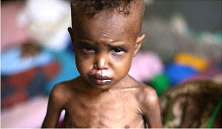Filed under: Abroad Program, Development, HIV/AIDS, Microfinance, Our History, Permaculture, Women
An op-ed published in the New York Times by Nicholas Kristof, an advocate of social justice and U.S. intervention throughout the developing world, the following is the story of Hidaya (right) and the need for young ambassadors to and from sub-Saharan Africa.

Cast your eyes [to the right] and meet Hidaya Abatemam, whom I met last month in a remote area of southern Ethiopia. She is 6 years old and weighs 17 pounds.
Hidaya was starved nearly to death and may well have suffered permanent mental impairment, helping to trap her—and her own children, if she lives that long—in another generation of poverty.
Yet maybe the more interesting question is not why Hidaya is starving but why the world continues to allow 30,000 children like her to die each day of poverty.
Ultimately what is killing girls like her isn’t precisely malnutrition or malaria, but indifference. And that, in turn, arises from our insularity, our inexperience in traveling and living in poor countries, so that we have difficulty empathizing with people like Hidaya.
I often hear comments from readers like: “It’s tragic over there, but we’ve got our own problems that we have to solve first.” Nobody who has held the hand of a starving African child could be that dismissive.
That lack of firsthand experience abroad also helps explain why we are so awful at foreign policy: we just don’t “get” how our actions will be perceived abroad, so time and again—in Vietnam, China, Iran, Iraq, Lebanon, Afghanistan and Latin America—we end up clumsily empowering our enemies.
Part of the problem is that American universities do an execrable job preparing students for global citizenship. A majority of the world’s population lives on less than $2 a day, but the vast majority of American students graduate without ever gaining any insight into how that global majority lives.
According to a Roper/National Geographic poll, 38 percent of Americans aged 18 to 24 consider speaking another language to be “not too important.” Sixty-three percent of those young Americans can’t find Iraq on a map of the Middle East. And 89 percent don’t correspond regularly with anyone outside the U.S.
A survey cited by the Modern Language Association found that only 9 percent of American college students enroll in a foreign language class.
Let’s face it: We’re provincial.
That’s one reason that I always exhort college students to take a “gap year” and roam the world, or at least to take a summer or semester abroad—and spend it not in Paris or London, but traveling through Chinese or African villages. Universities should give course credit for such experiences—and offer extra credit for students who catch intestinal worms.
[Note: The Arusha Project neither expects nor encourages you to catch intestinal worms.]
Leave a Comment so far
Leave a comment